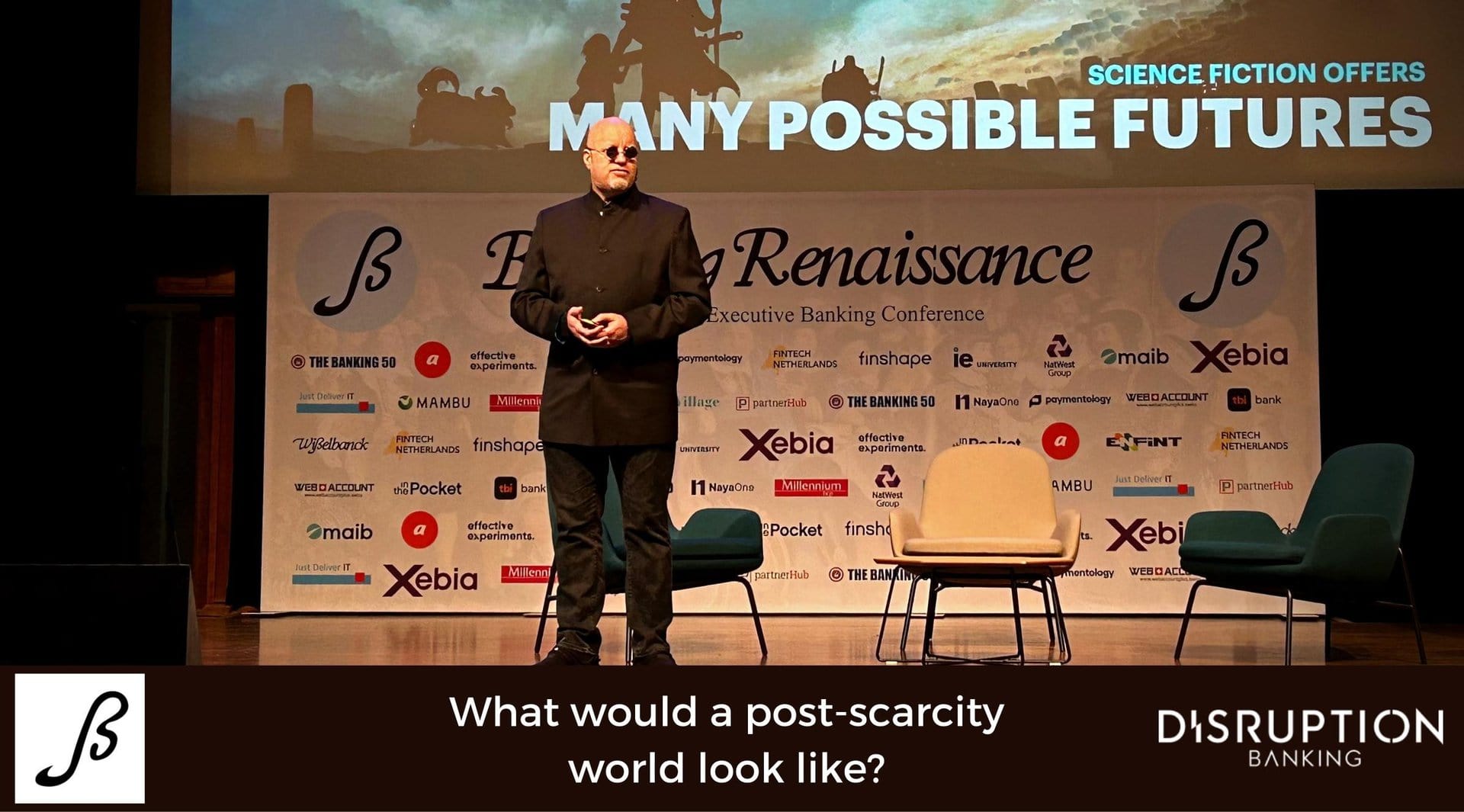Most basic definitions of economics revolve around the idea that the subject is about the allocation of scarce resources. Economics describes the way in which societies distribute a limited quantity of different goods, and the value people attribute to them. But what happens if those resources are no longer scarce? How do we arrange our economies and societies if everything is in abundance? How can we attribute something a value if we have endless supplies of it?
These are the questions prominent futurist and fintech personality Brett King explored during a talk in Amsterdam yesterday. While many people, at least in the Western world, believe that capitalism is the best (or even the only) way of ordering human economic affairs, King thinks that a coming technological revolution will radically alter that way of thinking.
Our host @BrettKing on stage in Amsterdam today talking The sci-fi future of banking pic.twitter.com/misPGYO2Sm
— TheFuturists #Futurists #Podcast (@FuturistPodcast) February 22, 2023
“The thought that in 10,000 years, the most efficient form of economics that we will ever find is capitalism is sort of laughable,” King said. That much is certainly fair. For most of human existence, feudal economic structures have been dominant. It is only really for the last couple of hundred years of so that the world, or rather some of it, has organised itself along capitalist lines. As societies and technologies evolve, economics will evolve with it, as they have always done.
“And yet,” King noted, “you see in the way we depict science fiction, super technology is imposed on the existing political and social infrastructure from an ideological perspective.” In other words, we are only capable of envisioning a future which is rooted in the same ideas and economic conditions of the present. What happens when those conditions are disrupted?
King believes that, because of new technologies such as artificial intelligence (AI), humans are on the precipice of a “post-scarcity abundance world.” He talked of a future where energy is free and limitless, where asteroids can provide all the resources humans need, and therefore one in which “wealth and money essentially become meaningless.” Wealth and money are based on scarcity; without scarcity, there is no wealth and money – or so the theory goes.
King pointed to recent work undertaken by NASA and SpaceX as evidence that this future isn’t as distant as some might think. In August this year, the two organisations are launching the “Psyche” mission, sending a prob to explore an asteroid that’s between Mars and Jupiter. This single asteroid is thought to contain raw materials, metals, alloys, and other commodities that are worth 100,000 times more than global GDP. The solar system contains millions of such asteroids. The scale is incomprehensible.
“Lindy Elkins-Tanton is leading a NASA mission to explore an asteroid rich with metals supposedly worth $10 quintillion that’s orbiting the sun between Mars and Jupiter. The asteroid’s name is Psyche, after the Greek goddess of the soul,” writes @petercoy. https://t.co/3YGVTYVJvJ
— New York Times Opinion (@nytopinion) February 8, 2023
“Once we have the capacity to access the resource in the solar system – the helium on the moon, the various gases in the gas giants, the asteroid belt, and so on – the traditional commodities market that we have on Earth will essentially become meaningless,” King said, “because of the availability of these very cheap resources in the post-scarcity abundance world.” In this future, capitalist ways of thinking would crumble because two of its most essential foundations – scarcity and the profit motive – would not be there.
Of course, it is not at all inevitable that this economic utopia will play out this way. King cited Aristotle and argued that “if you’re taking the Aristotelian view of philosophy, then you would have to say that, if we want the optimal existence for humanity and the future, it has to be one in which every human life has value.” But this view of the world hasn’t played out in the two thousand years since Aristotle first expressed it. The unique ability of humans to do evil would suggest that other futures are also possible – or probable.
Indeed, King conceives of a situation where a “feudal cabal” continues to impose an environment of scarcity even when resources are abundant. This is a possibility, but perhaps more likely is that the economic utopia simply isn’t as good as expected. A highly automated and technological world would almost certainly be one in which the role of human workers is greatly diminished. The value human beings attribute to themselves could also be undermined. Capitalists often argue that every time a new technology has been created, new jobs have been too. That is true, but then “we’ve never had a technology that can disrupt every form of human labour, simultaneously,” in King’s words.
Generative AI is here and already highly capable of reducing human labor hours. Policymakers need to get their asses in gear with programs like universal basic income as an AI dividend, and education reform to teach how to utilize AI and think critically.https://t.co/JinBILprRL pic.twitter.com/ahspSLywxi
— Scott Santens (@scottsantens) February 19, 2023
Besides, even less revolutionary technologies have had a profoundly disruptive impact on human labourers. Automation has had the positive effect of reducing working hours, but this means people are also getting paid less in turn. “Wages in the UK, US, and Australia haven’t kept up with CPI increases for 40 years,” King noted. In a utopia, wages wouldn’t matter – or even be a feature of economies – but human history would indicate that any hyper-technological future would have its winners and losers. If the rewards of AI are great, in terms of economic efficiency and scientific progress, then the drawbacks could be just as great or even bigger. King believes that mass civil unrest and social revolution could be the price to pay for not getting the future right. Disruption can become chaos if it is unleashed in a careless way.
If a post-scarcity abundance world is indeed around the corner, it seems inevitable that capitalism, in the way we currently understand it, will collapse. Economics will need to be about something else than the allocation of scarce resources. That doesn’t mean that human nature will necessarily change with it. Greed, fear, and ambition are all powerful forces; defining features of how economies and societies are organised. Perhaps the scale of the change that could be coming – and King at least hoped this will be the case – will change all of that; perhaps what King called a “techno socialist” order is on it way. The pages of history suggest that this is an optimistic view.
Author: Harry Clynch
#Economics #Capitalism #PostScarcity #AI















